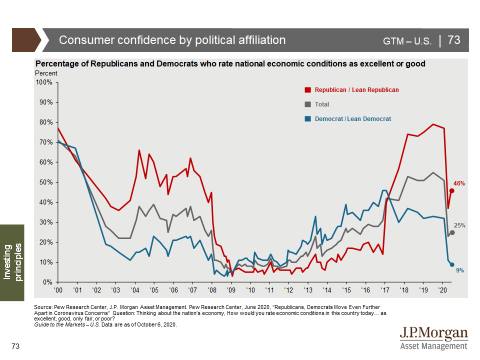Politics and Investing Don’t Mix
As we approach our country’s 58th presidential election, political acrimony is reaching a fevered pitch. Many of you may be active in party politics whereas some strongly favor one candidate over another. Well, I have some bad news: Your politics may be killing you in the markets.
In my work, I use behavioral economics, financial biases, statistics, data analysis, mathematics, history, and psychology to make better investing decisions. All of these factors heavily influence investor behavior and impact our decision process. While it’s true that good decisions can benefit your investment portfolio, avoiding bad decisions is more important.
We humans have a propensity to make the same mistakes over and over again. We are all hard wired to see threats and respond with our natural tendency to fight-flight-or-freeze. Whereas, our ancestors were responding to threats to life and limb we experience potential or perceived threats to a way of life or belief system with the same response system. And it drives investors to make costly emotional decisions.
Neurophysiologists, who research cognitive functions, have found that people with intense emotional interest in a subject tend to lose the ability to observe it objectively. This has been found true not just for partisan political junkies, but also ardent sports fans, and even avid hobbyist. This probably explains why my March Madness brackets always have UNC on top. Research by Nobel laureate economist Daniel Kahneman has shown that as you become more emotionally invested in a subject you have a tendency to selectively perceive events and ignore data and facts that disagree with your main philosophy. Even your memory works to fool you, as you selectively retain what you believe in, and mask conflicting memories.
 This cognitive bias is not an occasional problem – it is a systematic source of errors and effects everyone in different areas. It’s just how we are all built. And it is the reason most people are terrible investors.
This cognitive bias is not an occasional problem – it is a systematic source of errors and effects everyone in different areas. It’s just how we are all built. And it is the reason most people are terrible investors.
So how does this play out in investing and politics. One of the key components of investors’ propensity to invest is their confidence in the strength of the national economy and more importantly the direction of the economy. The graph below provided by our friends at J.P. Morgan show consumer confidence by political affiliation. It is easy see that during the during President Bush’s post 9/11 growth years between Jan ’03 – Dec ’07 that high percentage of republican saw the economy as favorable whereas very few democrats agreed. During this period the S&P 500 saw an average growth rate of 12.82%.
The inverse of this is proved true during President Obama’s growth years Jan ’12 – Oct ’16. Democratic investors expressed their economic confidence at a ~3 times higher rate than republican counter parts. The S&P 500 experienced a 14.2% annual growth rate during this time.
The election of President Trump in Nov ’16 saw confidence tables reverse again as republicans gained confidence and democratic confidence waned. The S&P 500 is up 14.58% since the election.
It appears that many people tend to tie their future hope to a political party and discount that robustness of American businesses to adjust to changing economic times and political environments. Hating the government is not an investment strategy and the resident of 1600 Pennsylvania Avenue is of low level consideration in developing an investment portfolio.
You don’t have to be a math wizard or an economist to be a successful investor. But you do need to understand that investor behavior is generally the greatest risk to achieving your goals. We all have financial biases that create blind spots and those blind spots can lead us into poor decision making. Understanding how your own biases impact your investing process is a key step in helping to improve your investment outcomes.
Sources: J.P. Morgan, Factset, Thinking Fast & Slow by Daniel Kahneman
Any opinions are those of Gary Greene and not necessarily those of Raymond James. Investing involves risk and you may incur a profit or loss regardless of strategy selected. Past performance does not guarantee future results. Keep in mind that individuals cannot invest directly in any index. The S&P 500 is an unmanaged index of 500 widely held stocks that is generally considered representative of the U.S. stock market.

